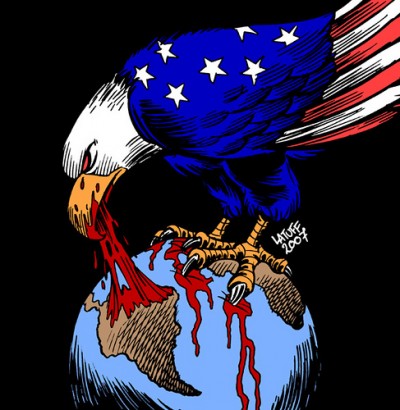Endless Imperial Wars From Africa to the Americas and Across the World
Six centuries of European dominance prompted resistance and independence struggles

The statement below was delivered in part at the United National Antiwar Conference held during May 8-10, 2015 in Secaucus, New Jersey. This event attracted hundreds of anti-imperialist and peace activists from across the United States, Canada, Britain, the Middle East and Asia. Pan-African News Wire editor Abayomi Azikiwe addressed the conference on four occasions on plenary sessions, panels and during the summation which discussed action proposals aimed at intensifying the struggle to end the U.S. wars both internationally and domestically. The conference represented the largest gathering of antiwar and social justice activists during 2015.
In order to fully understand the current period of imperialist rule throughout Africa, Asia, Latin America and within the geographic boundaries of the European continent and the western hemisphere, we must acknowledge the role of the 15th century interventions in Africa and other parts of the world.
Beginning in 1402, the Kingdom of Castile, a precursor to modern-day Spain, invaded the territories off the coast of North Africa known as the Canary Islands. This period in Southern European history represented the initiation of an expansion into Africa and Latin America stemming from an alliance between the mercantilists and the monarchies of both Spain and Portugal.
This intervention into the North African islands of the Mediterranean was met with fierce resistance for nearly a century. It was not until 1495 that the rulers of Spain could claim control over the Canaries. The role of Portugal in taking control of other islands such as the Azores and Cape Verde, set the stage for the expansion of the Atlantic Slave Trade, the colonization of South America, Central America and the Caribbean Islands as well as the encroachment into North America.
Within the Canary Islands as early as the latter years of the 15th century a pattern of colonialism was established that would continue until the contemporary era. After the conquest, the Castilians imposed an economic model based on single-crop production for export. First utilizing sugar cane and later wine, which was an important item of trade with England.
During this period the first exploitative structures of a colonial regime were established. Both Gran Canaria, a colony of Castile since March 6, 1480 (from 1556, of Spain), and Tenerife, a Spanish colony since 1495, had separate governors, connoting the soon to be system of divide and rule.
Through the conquering of these African islands, the Atlantic Slave Trade would flourish through the 19th century when European rulers imposed a colonial project based on an increasing industrialized method of production and labor exploitation. By this time most of Africa had been conquered by Europe with the Berlin Conference of 1884-85 serving to provide additional legal cover for the institutionalization of colonial rule which was just as genocidal and socially disruptive as the system of slavery.
From Colonialism to Neo-Colonialism
The Atlantic Slave Trade and colonialism was a violent system of exploitation which brought other European countries into the process. After the initiation by Spain and Portugal, many other burgeoning nation-states in Europe become involved including Holland, Denmark, Germany, Italy, Britain and France.
This initiative did not remain limited to Africa and the Western Hemisphere but extended eastward to today’s Middle East, Asia and the Pacific Islands. Both World Wars of the first half of the twentieth century were largely based on the struggle between various European states, the waning Ottoman Empire (which collapsed during World War I) and Japan in a ruthless campaign to conquer the world and its resources. The national liberation movements which emerged forcefully during and after World War II would reshape international politics.
With the emergence of newly-independent states throughout Latin America earlier during the 19th century and within Africa, many parts of the Caribbean and the Asian-Pacific after 1945, the imperialist developed the system of neo-colonialism, where control was maintained through economic and military means despite the granting of political independence. The socialist revolutions in Russia, China, North Korea, North Vietnam and later Cuba, provided an alternative model for development where post-colonial and underdeveloped states could challenge imperialism on a global scale.
Imperialist War in the 21st Century: The Greatest Threat to World Peace
Although after the collapse of the Soviet Union and the Eastern European socialist states by the early 1990s, the U.S. imperialists suggested that there would be a so-called “peace dividend.”
Nonetheless, the shareholders only found new ways to embark upon other wars. From Iraq, Afghanistan, Panama, Libya, Syria, Yemen, Sudan and other geo-political regions, the wars of regime-change have proven to be just as deadly and destabilizing as those of the previous century.
A recent report by the United Nations Refugee Agency indicated that the number of Internally Displaced Persons (IDPs) and migrants are higher than any period since the conclusion of World War II. It is estimated that well over 50 million people have been dislocated with the largest segment of these populations emanating from the U.S.-instigated wars in Afghanistan, Iraq-Syria and the Horn of Africa (Somalia, Ethiopia, Eritrea, Djibouti).
We are witnessing the impact of these dislocations in the Mediterranean this year. Within the same region where the Atlantic Slave Trade was born, over two thousand people have died at sea so far during 2015.
This problem will not end until those of us based in the western industrialized states build a formidable anti-imperialist and anti-war movement in alliance with the peoples of the oppressed nations to end these modern wars of conquest. The impoverishment of the nationally oppressed and working class in Europe and North America cannot be ended until imperialism is destroyed; therefore our fate is linked with the status and future of the peoples of the world.

